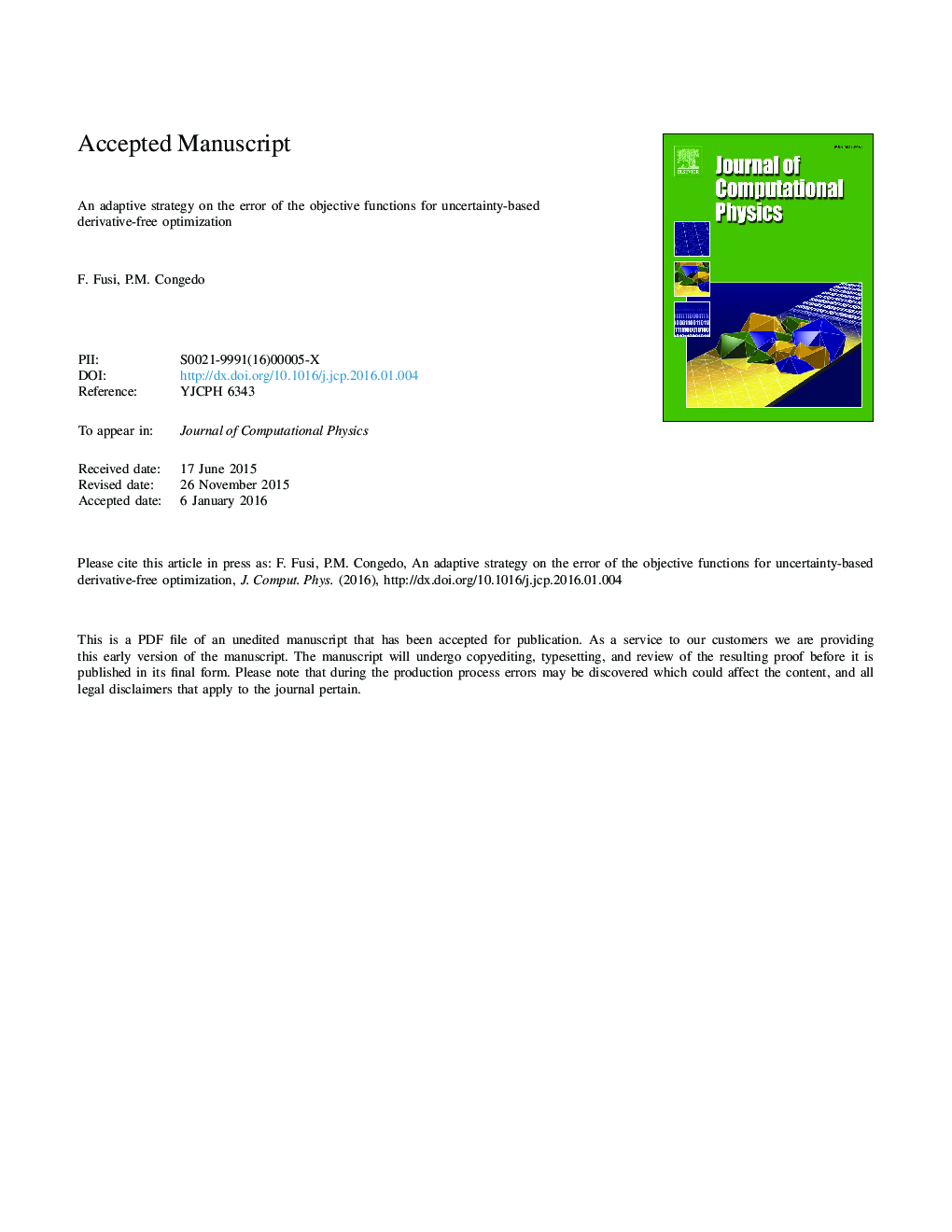| کد مقاله | کد نشریه | سال انتشار | مقاله انگلیسی | نسخه تمام متن |
|---|---|---|---|---|
| 6930528 | 867610 | 2016 | 44 صفحه PDF | دانلود رایگان |
عنوان انگلیسی مقاله ISI
An adaptive strategy on the error of the objective functions for uncertainty-based derivative-free optimization
ترجمه فارسی عنوان
یک استراتژی انطباق بر خطا از توابع هدف برای بهینه سازی مشتق شده مبتنی بر عدم قطعیت
دانلود مقاله + سفارش ترجمه
دانلود مقاله ISI انگلیسی
رایگان برای ایرانیان
کلمات کلیدی
بهینه سازی مبتنی بر عدم اطمینان، بهینه سازی قوی، جعبه محدود کننده خطای سازگاری
ترجمه چکیده
در این کار، یک استراتژی برای مقابله با خطای موثر بر توابع هدف در بهینه سازی مبتنی بر عدم قطعیت ایجاد شده است. ما به مشکلاتی اشاره می کنیم که در آن توابع هدف، آماری از مقدار منافع محاسبه شده با روش کوانتایی عدم قطعی است که برخی از عدم اطمینان از متغیرهای ورودی را از طریق سیستم مورد بررسی تحلیل می کند. در مسائل واقعی، آمار با یک روش عددی محاسبه می شود و بنابراین با توجه به دقت انتخاب شده، میزان خطای خاصی تحت تاثیر قرار می گیرد. اشتباهات در تابع هدف می تواند با انتزاع یک محدوده در اطراف تخمین اسمی در فضای تابع هدف تفسیر شود. علاوه بر این، در برخی موارد روش های اندازه گیری عدم قطعیت ارائه توابع هدف نیز امکان پالایش انطباقی را برای کاهش محدوده خطا فراهم می کند. روش جدید بر تبادل اطلاعات بین حلقه بیرونی مبتنی بر الگوریتم بهینه سازی و حلقه کمینه تعریف عدم اطمینان داخلی متکی است. به طور خاص، در حلقه کمینه تعریف عدم اطمینان درونی، کنترل برای تصمیم گیری در مورد اینکه آیا اصلاح جعبه محدود برای طراحی فعلی مناسب است یا نه، انجام می شود. در مسائل تک هدف، کادر محدود کنونی با طراحی مطلوب در حال حاضر مقایسه می شود. در مسائل چند هدفه، تصمیم بر اساس مقایسه جعبه محدوده خطای طراحی فعلی و جبهه پارتو فعلی استوار است. با استفاده از این استراتژی، محاسبات کمتر برای راه حل های به وضوح غالب صورت می گیرد و برآورد دقیق تابع هدف برای راه حل های جالب و غالب غلبه می شود. نتایج ارائه شده در این کار ثابت می کند که روش پیشنهاد شده، کارایی حلقه های جهانی را بهبود می بخشد، در حالی که حفظ صحت نهایی پارتو نهایی است.
موضوعات مرتبط
مهندسی و علوم پایه
مهندسی کامپیوتر
نرم افزارهای علوم کامپیوتر
چکیده انگلیسی
In this work, a strategy is developed to deal with the error affecting the objective functions in uncertainty-based optimization. We refer to the problems where the objective functions are the statistics of a quantity of interest computed by an uncertainty quantification technique that propagates some uncertainties of the input variables through the system under consideration. In real problems, the statistics are computed by a numerical method and therefore they are affected by a certain level of error, depending on the chosen accuracy. The errors on the objective function can be interpreted with the abstraction of a bounding box around the nominal estimation in the objective functions space. In addition, in some cases the uncertainty quantification methods providing the objective functions also supply the possibility of adaptive refinement to reduce the error bounding box. The novel method relies on the exchange of information between the outer loop based on the optimization algorithm and the inner uncertainty quantification loop. In particular, in the inner uncertainty quantification loop, a control is performed to decide whether a refinement of the bounding box for the current design is appropriate or not. In single-objective problems, the current bounding box is compared to the current optimal design. In multi-objective problems, the decision is based on the comparison of the error bounding box of the current design and the current Pareto front. With this strategy, fewer computations are made for clearly dominated solutions and an accurate estimate of the objective function is provided for the interesting, non-dominated solutions. The results presented in this work prove that the proposed method improves the efficiency of the global loop, while preserving the accuracy of the final Pareto front.
ناشر
Database: Elsevier - ScienceDirect (ساینس دایرکت)
Journal: Journal of Computational Physics - Volume 309, 15 March 2016, Pages 241-266
Journal: Journal of Computational Physics - Volume 309, 15 March 2016, Pages 241-266
نویسندگان
F. Fusi, P.M. Congedo,
